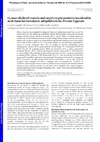Please use this identifier to cite or link to this item:
https://accedacris.ulpgc.es/jspui/handle/10553/6571
| Title: | Human skeletal muscle and erythrocyte proteins involved in acid-base homeostasis: adaptations to chronic hypoxia | Authors: | Juel, C. Lundby, Carsten Sander, M. Calbet, J. A.L. van Hall, Gerrit |
UNESCO Clasification: | 241106 Fisiología del ejercicio | Keywords: | Hypoxia Altitude Blood Erythrocytes Lactate |
Issue Date: | 2003 | Journal: | Journal of Physiology | Abstract: | Chronic hypoxia is accompanied by changes in blood and skeletal muscle acid-base control. We hypothesized that the underlying mechanisms include altered protein expression of transport systems and the enzymes involved in lactate, HCO3- and H+ fluxes in skeletal muscle and erythrocytes. Immunoblotting was used to quantify densities of the transport systems and enzymes. Muscle and erythrocyte samples were obtained from eight Danish lowlanders at sea level and after 2 and 8 weeks at 4100 m (Bolivia). For comparison, samples were obtained from eight Bolivian natives. In muscle membranes there were no changes in fibre-type distribution, lactate dehydrogenase isoforms, Na+,K+-pump subunits or in the lactate-H+ co-transporters MCT1 and MCT4. The Na+-H+ exchanger protein NHE1 was elevated by 39 % in natives compared to lowlanders. The Na+-HCO3- co-transporter density in muscle was elevated by 47-69 % after 2 and 8 weeks at altitude. The membrane-bound carbonic anhydrase (CA) IV in muscle increased in the lowlanders by 39 %, whereas CA XIV decreased by 23-47 %. Levels of cytosolic CA II and III in muscle and CA I and II in erythrocytes were unchanged. The erythrocyte lactate-H+ co-transporter MCT1 increased by 230-405 % in lowlanders and was 324 % higher in natives. The erythrocyte inorganic anion exchanger (Cl--HCO3- exchanger AE1) was increased by 149-228 %. In conclusion, chronic hypoxia induces dramatic changes in erythrocyte proteins, but only moderate changes in muscle proteins involved in acid-base control. Together, these changes suggest a hypoxia-induced increase in the capacity for lactate, HCO3- and H+ fluxes from muscle to blood and from blood to erythrocytes. | URI: | https://accedacris.ulpgc.es/handle/10553/6571 | ISSN: | 0022-3751 | DOI: | 10.1113/jphysiol.2002.035899 | Source: | Journal of Physiology[ISSN 0022-3751],v. 548, p. 639-649 |
| Appears in Collections: | Artículos |
Show full item record
SCOPUSTM
Citations
105
checked on Jun 8, 2025
WEB OF SCIENCETM
Citations
94
checked on Feb 1, 2026
Page view(s) 10
313
checked on Jan 15, 2026
Download(s)
380
checked on Jan 15, 2026
Google ScholarTM
Check
Altmetric
Share
Export metadata
This item is licensed under a Creative Commons License

